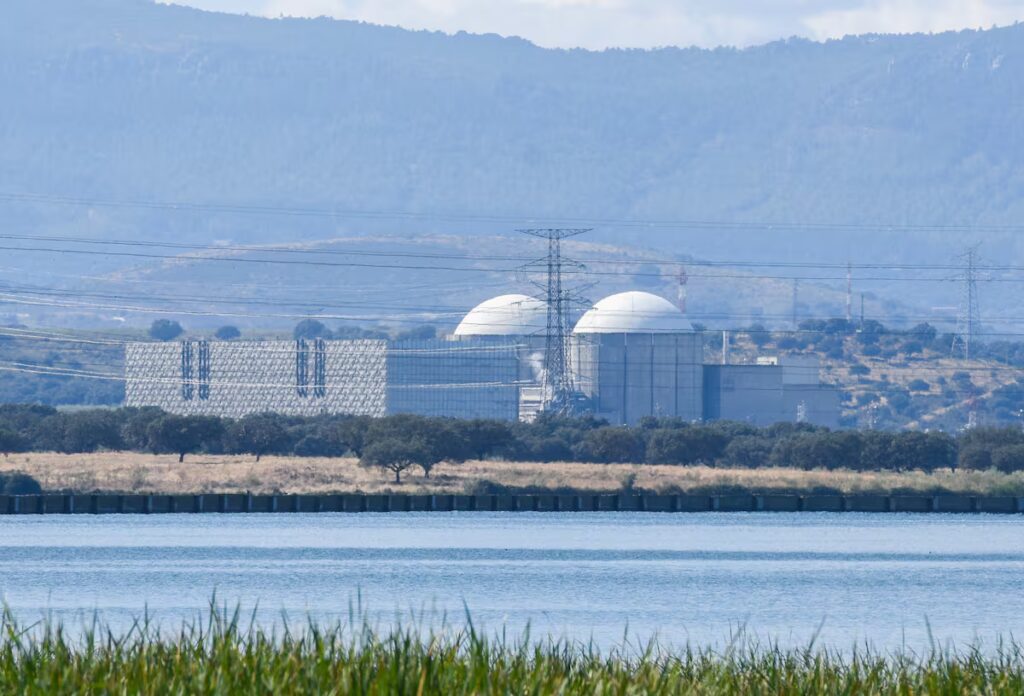While the opposition insists on keeping the power plants open beyond the scheduled timeline, the government closes ranks around renewables
The unprecedented blackout that struck mainland Spain and Portugal earlier this week has reignited the cultural and political battle over the future of nuclear energy. Spain’s current energy roadmap — endorsed by the European Commission — outlines a gradual phase-out of the country’s five nuclear power plants. However, the conservative People’s Party (PP) and far-right Vox have long championed nuclear power and vehemently oppose the government’s decommissioning plans.
On Tuesday, PP leader Alberto Núñez Feijóo launched a renewed offensive in a series of morning interviews. “The urgent need for backup energy is clear,” he said, referring to nuclear power. “We have plenty of renewable energy, and that’s good — but it’s volatile. Our energy system is being managed with an enormous ideological bias,” he added in a radio interview, where he called for the nuclear phase-out to be reversed.
Just hours later, Prime Minister Pedro Sánchez, from the Spanish Socialist Party (PSOE), addressed the issue from La Moncloa Palace, the seat of government. “There was no problem caused by an excess of renewable energy,” he said, in reference to the cause of the blackout. “Those who link this incident to the lack of nuclear energy are either lying or revealing their ignorance,” he continued. Sánchez also pointed out that, for safety reasons, nuclear plants could not assist in restoring the power grid after the blackout.
Spain currently has five operational nuclear power plants, and a total of seven reactors. Together, they have so far provided about 20% of the country’s electricity. However, the rise of renewable energy sources has steadily reduced nuclear’s share of the energy mix. This is due to the fact that nuclear plants simply can’t compete with the lower costs of solar and wind energy.
Renewable energy expert Xavier Cugat notes that, just minutes before the blackout — at 12:32 p.m. on Monday — renewables were supplying around 70% of the country’s electricity demand. Only four of the seven nuclear reactors were online at that time; the rest had been shut down because they couldn’t compete economically with solar and wind power.
This spring has seen repeated records in renewable energy production, leaving nuclear facilities operating well below capacity. “Only two reactors were running during Easter,” Cugat adds.
The pro-nuclear lobby argues that they are less competitive due to what they call the tax burden. But beyond taxes, a significant portion of their costs comes from the complex and expensive management of radioactive waste — a key reason for why nuclear power is less economically competitive than renewable energy.
But Spain’s political right insists on the need to provide financial support for maintaining nuclear energy in the country. Juan Bravo, the PP’s deputy secretary for economic affairs, was visiting the Almaraz nuclear power plant in Cáceres when the blackout occurred. His visit aimed to underscore the party’s support for extending the life of the plant, which is the first scheduled for closure under the government’s plan.
That roadmap to phase out nuclear power — which is set to be replaced by renewables and energy storage — did not emerge out of nowhere. It is based on an agreement that the electricity companies signed in 2019 with Enresa, the public company responsible for managing their radioactive waste.
But for the past year, power companies have begun to publicly question that timetable and are calling for the plants to remain in operation longer. However, up to now, the companies have not reached a consensus on a proposal to present to the government.
Meanwhile, time is running out for Almaraz, and this makes the planned shutdown of its first reactor — scheduled for autumn 2027 — seem increasingly irreversible, further raising tensions and pressure.
The PP submitted a bill to Parliament to prevent the scheduled closure, citing the “geopolitical situation” as justification. In addition, the party has made its support for the government’s decree to mitigate the impact of Trump’s tariffs conditional on the executive agreeing to extend the life of the nuclear plants.
However, the Ministry for Ecological Transition maintains that it has not received any concrete proposals from the energy companies, which are the ones that agreed to the shutdown schedule in 2019. “There is no formal proposal from the owners of Almaraz to extend the shutdown timeline,” sources from the Ministry stated two weeks ago. They added: “In the talks held with the companies, the ministry has also not seen any clear or unified position regarding Almaraz’s future.” The ministry also emphasized that it has “made it clear to the companies that the tax burden and waste management costs will not fall on consumers.”
Source: El Pais


